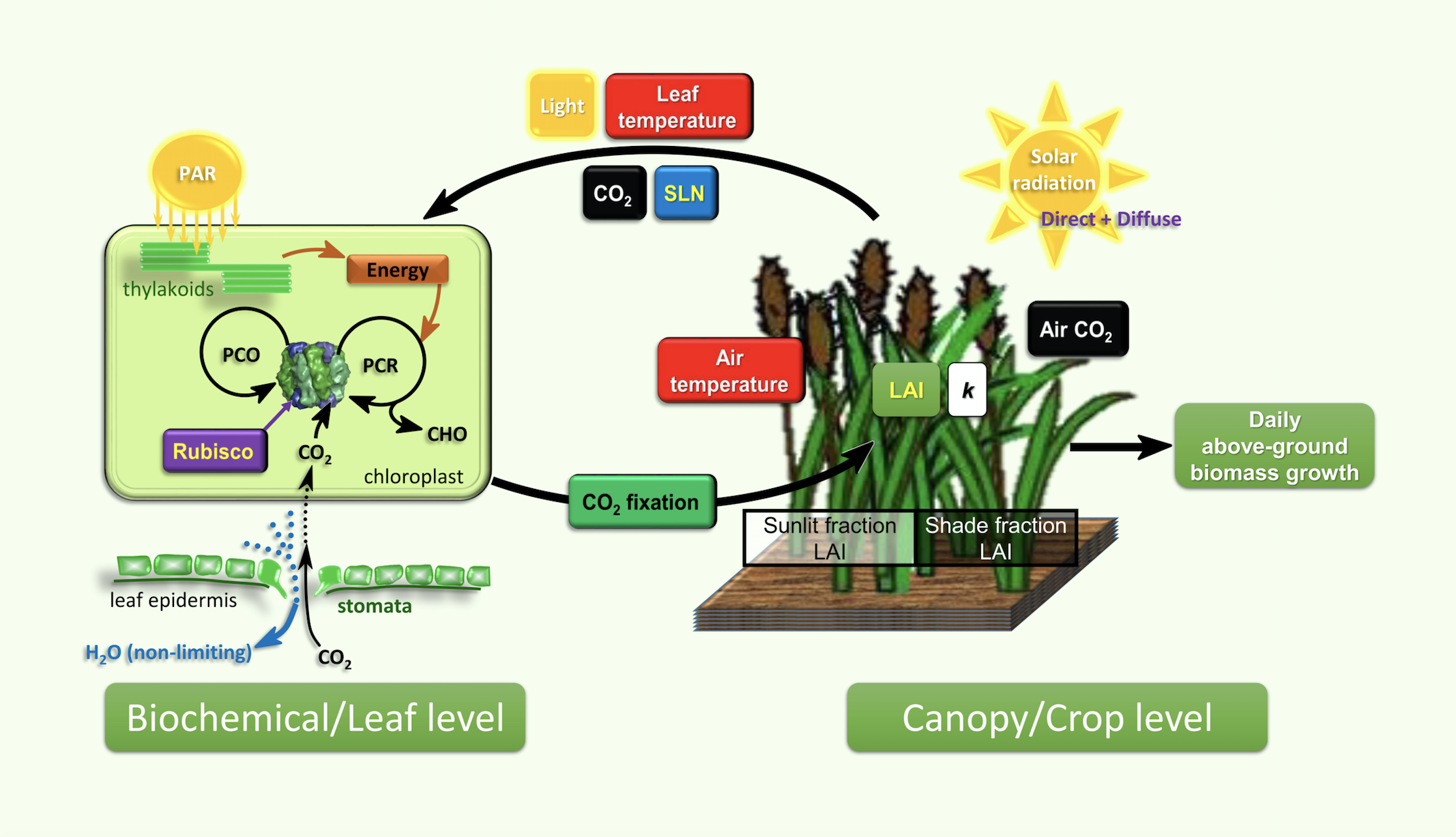- About
- Members
- Join
- Member log in
- Membership Renewal
- Member directory
- Life Members
- ASPS Life Member Professor Graham Farquhar
- ASPS Life Member Associate Professor Hendrik (Hank) Greenway
- ASPS Life Member Dr Marshall (Hal) D Hatch
- ASPS Life Member Dr Paul E Kriedmann
- ASPS Life Member Dr Mervyn Ludlow
- ASPS Life Member Emeritus Professor Rana Munns
- ASPS Life Member Conjoint Professor Christina E Offler
- ASPS Life Member Professor (Charles) Barry Osmond
- ASPS Life Member Emeritus Professor John W Patrick
- ASPS Life Member Dr Joe Wiskich
- Corresponding Members
- Elected Fellows
- Events
- Awards & Funding
- Employment
- Publications
- Research
- Teaching
- Menu
Crop Simulation Software Helps to Find Better Crops
23 January 2018
Plant researchers have developed an online application that predicts how crop growth is affected by photosynthetic changes at the molecular, cellular or leaf level of plants.
Food production depends on photosynthesis, the process by which plants capture sunlight and convert it into plant growth, biomass and grain. In the next decades, the world population is expected to reach 9.5 billion and food demand will increase significantly, so improving photosynthesis has become a global research priority.
“Enhancing photosynthesis has the potential to increase crop yields, but the link between photosynthesis and crop productivity is not straightforward because it crosses multiple scales of biological organisation. We created modelling tools that help us navigate through these complexities to identify targets that have the greatest impact on crop yield,” says Dr Alex Wu, a researcher with the ARC Centre of Excellence for Translational Photosynthesis (CoETP) at the University of Queensland.
This online “crystal ball” of crop growth, a small part of the cross-scale model, is designed to show researchers what would happen to a crop canopy with changes in photosynthesis under variable environmental and canopy conditions such as radiation, temperature, levels of CO2, canopy size and amount of nitrogen in leaves.
“Developing simulation tools like these, we are working towards connecting lab-based research and discoveries, at the leaf or molecular level, with crop productivity under variable environmental conditions,” Dr Wu said.
ARC CoETP Chief Investigator Professor Graeme Hammer says that researchers could now use the online application and see how their work is having an impact on crops in the field, which will radically accelerate the discovery process.
“They can also incorporate high temperature or high CO2 conditions to test effects of climate change,” he said.
The Diurnal Canopy Photosynthesis Simulator (DCaPS) online application, calculates diurnal (period from sunrise to sunset) canopy CO2 assimilation and daily biomass increment for a crop under well-watered conditions. DCaPS is now publicly available at www.dcaps.net.au.
This study was published recently in the journal Functional Plant Biology and was funded by the Australian Research Council (ARC) Centre of Excellence for Translational Photosynthesis and the Queensland Alliance for Agriculture and Food Innovation (QAFFI) at the University of Queensland. Article appeared in “Leaflet” Newsletter of the CoE.
Recent Posts
Tags
Archives
- June 2025
- May 2025
- April 2025
- March 2025
- February 2025
- January 2025
- December 2024
- November 2024
- October 2024
- September 2024
- August 2024
- July 2024
- June 2024
- May 2024
- April 2024
- February 2024
- January 2024
- November 2023
- October 2023
- September 2023
- August 2023
- July 2023
- June 2023
- May 2023
- April 2023
- March 2023
- February 2023
- December 2022
- November 2022
- October 2022
- September 2022
- August 2022
- July 2022
- June 2022
- May 2022
- April 2022
- March 2022
- February 2022
- January 2022
- December 2021
- November 2021
- October 2021
- September 2021
- August 2021
- July 2021
- June 2021
- April 2021
- March 2021
- February 2021
- January 2021
- December 2020
- November 2020
- October 2020
- September 2020
- August 2020
- July 2020
- June 2020
- May 2020
- April 2020
- March 2020
- February 2020
- January 2020
- December 2019
- November 2019
- October 2019
- September 2019
- August 2019
- July 2019
- June 2019
- May 2019
- April 2019
- March 2019
- February 2019
- January 2019
- December 2018
- November 2018
- October 2018
- September 2018
- August 2018
- July 2018
- June 2018
- May 2018
- April 2018
- March 2018
- February 2018
- January 2018
- December 2017
- November 2017
- October 2017
- September 2017
- August 2017
- July 2017
- June 2017
- May 2017
- April 2017
- March 2017
- February 2017
- January 2017
- December 2016
- November 2016
- October 2016
- September 2016
- August 2016
- July 2016
- June 2016
- May 2016
- April 2016
- March 2016
- February 2016
- January 2016
- December 2015
- November 2015
- October 2015
- September 2015
- August 2015
- July 2015
- June 2015
- May 2015
- April 2015
- March 2015
- February 2015
- January 2015
- December 2014
- November 2014
- October 2014
- September 2014
- August 2014
- July 2014
- June 2014
Copyright 2017 Australian Society of Plant Scientists Disclaimer & Privacy
Website by Michael Major Media
